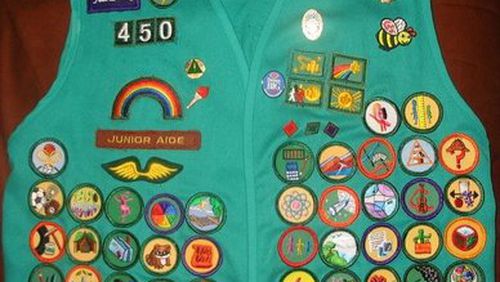Some of my favorite summers were spent at Girl Scout camp. I still have my sash with the badges I earned with my troop, including Cook and Housekeeper. (No sure how I earned that last one as I never even made my bed and still don’t.)
The focus of the badges --earned after a scout explores a new area and learns related skills -- has evolved with the times to now include Cybersecurity and Space Science. The two are among the 30 new badges released today by the Girls Scouts to excite scouts about STEM and help them develop the leadership skills necessary to make a difference in their communities.
The new badges reflect the campaign across schools and youth organizations to interest more girls in science and technology, the fields where most of the high-paying jobs are now and will be in the future.
Despite the push, a stubborn gender gap remains. Only 27 percent of U.S. students taking the AP computer science exam are female. (Here is an excellent article from the Guardian on the complex causes behind the gender gap.)
Here is the official announcement of the new badges:
Girl Scouts of Greater Atlanta and Girl Scouts of the USA have released 30 new badges that address some of society’s most pressing needs, such as cybersecurity, environmental advocacy, mechanical engineering, robotics, computer science, and space exploration.
These badges are now available exclusively for girls ages 5–18 that enhance their one-of-a-kind Girl Scout experience. These new badges help Girl Scouts develop both soft skills like confidence and perseverance, as well as hard skills like design thinking and computer programming, setting them up for success and preparing them to take action for a better world.
Today's youth are more vocal than ever about the change they want to see, and Girl Scouts equips girls with the skills they need to make a real impact. The results are proven: girls who participate in Girl Scouts are more than twice as likely to exhibit community problem-solving skills than non-Girl Scouts (57 percent versus 28 percent).
The unique Girl Scout environment provides fun, exciting, and essential experiences that carry into girls' future careers and life success; the KPMG Women's Leadership Study of more than 3,000 professional and college women shows that early exposure to leadership has a significant impact on a woman's perceptions of her ability to lead. Additionally, 76 percent of women today wish they had learned more about leadership and had more leadership opportunities while growing up, demonstrating how imperative it is for girls and volunteers to join Girl Scouts.
The new programming for girls in grades 6–12 includes:
Environmental Stewardship badges, Girl Scouts' first-ever badge series focused on environmental advocacy. Girls in grades 6–12 prepare for outdoor experiences and take action on environmental issues. Although Girl Scouts have been advocating for the environment since the organization's founding 106 years ago, these badges are the first to specifically prepare girls to be environmental advocates who address problems, find solutions, and protect the natural world (funded by the Elliott Wildlife Values Project).
Badges that teach girls how to program, design, and showcase robots, completing the suite of Robotics badges first introduced for grades K–5 last year.
The College Knowledge badge for Girl Scouts in grades 11 and 12, the first badge completely dedicated to college exploration. By showing girls how to research the admissions process, financial aid, and other factors, the badge fills a specific need that girls asked for—and that many do not have support for outside Girl Scouts.
Two Girl Scout Leadership Journeys: Think Like a Programmer (funded by Raytheon) provides a strong foundation in computational thinking and the framework for Girl Scouts' first ever national Cyber Challenge, coming in 2019. The Think Like an Engineer Journey exposes girls to design thinking to understand how engineers solve problems. As with all Leadership Journeys, girls complete hands-on activities and use their newly honed skills to take action on a problem in their community. The programming aims to prepare girls to pursue careers in fields such as cybersecurity, computer science, and robotics.
Girls in grades K–5 can now earn badges in:
Environmental Stewardship, through which girls learn how to respect the outdoors and take action to protect the natural world (funded by the Elliott Wildlife Values Project).
Cybersecurity, introducing girls to age-appropriate online safety and privacy principles, information on how the internet works, and how to spot and investigate cybercrime (funded by Palo Alto Networks).
Space Science, enabling girls to channel their inner NASA scientist as they learn about objects in space and how astronomers conduct investigations. (funded by NASA's Science Mission Directorate and led by the SETI Institute).
Mechanical Engineering for Girl Scout Juniors, through which girls in grades 4 and 5 design paddle boats, cranes, and balloon-powered cars, learning about buoyancy, potential and kinetic energy, machines, and jet propulsion. Following last year's introduction of Mechanical Engineering badges for girls in grades K–3, the addition of these badges for Girl Scout Juniors means that all Girl Scouts in elementary school can now have hands-on engineering experiences.
“Across the country, people are having powerful conversations about the increasingly strong voice of young people who want to change the world and the lack of women in leadership positions in the United States—two topics Girl Scouts is uniquely positioned to address,” said Amy Dosik, CEO of Girl Scouts of Greater Atlanta. “Whether they are fighting cybercrime, exploring how engineers solve problems, or advocating for issues affecting their community, Girl Scouts are learning how to proactively address some of the foremost challenges of today while also building skills that will set them up for a lifetime of leadership.”
About the Author







